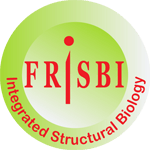FRISBI


X-ray crystallography is one of the most favored techniques for the determination of the atomic structure of proteins, nucleic acids and other molecules. The crystallography facility can provide service and scientific support to clients for their structural biology projects. Workflow for X-ray protein structure determination consists of crystal, diffraction pattern, electron density maps and protein model.
The I2BC crystallography facility (https://www.i2bc.paris-saclay.fr/structural-biology/crystallization/, labelled IBiSA) is equipped with several nano-volume pipetting (including Lipidic cubic phase for membrane proteins) and visualization robots, which allow large-scale screening of crystallization conditions at two temperatures (4°C and 19°C). Additionally, the robots facilitate analysis and automated optimization of crystallization conditions for macromolecules. Services provided by the platform include self-service access to crystallization and visualization robots, provision of ready-to-use crystallization kits, and project delivery encompassing structure determination and analysis, including AlphaFold service and model analysis.
The crystallography platform benefits of the proximity of the synchrotron Soleil and collaborate with the PROXIMA 2 beamline for the development of in situ collected data.
It is IBiSA labeled (Biology Health and Agronomy Infrastructures) and has the support of the “French Infrastructure for Integrated Structural Biology” (FRISBI). It is open to the entire scientific community including academia and industry.
The platform belongs to Яéciprocs (Réseau des Chercheurs et Ingénieurs Professionnels de la Cristallographie Structurale).
Services :
Devices:
Liquid Handling Robot: Tecan and Hamilton at 19°C: These robots are used for dispensing mother liquor solutions in the crystallization well reservoir (100-150 µl) and setting up high volume crystallization trials (0.5 µl to 2 µl).
Crystallization Robot: Cartesian at 19°C and Mosquito (LCP) at 4°C and 19°C: These robots are used to set up low volume crystallization drops in plates prefilled by the Tecan and Hamilton robots.Routinely, volumes of 100 nl are used for both the protein and the precipitant.
Imaging System: RI1000 Formulatrix at 4°C and 19°C: After preparation of the crystallization trays, these are stored in a crystallization cabinet equipped with a robotized visualization system that at regular intervals takes pictures of the crystallization drops and stores them on computer for inspection.